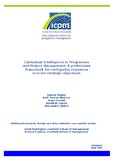- CERES Home
- →
- School of Management (SoM)
- →
- SoM Working and Occasional Papers
- →
- View Item
JavaScript is disabled for your browser. Some features of this site may not work without it.
| dc.contributor.author | Maylor, Harvey | |
| dc.contributor.author | Murray-Webster, Ruth | |
| dc.contributor.author | Geraldi, Joana | |
| dc.contributor.author | Lupson, Jonathan | |
| dc.contributor.author | Giudici, Alessandro | |
| dc.date.accessioned | 2009-09-22T10:47:46Z | |
| dc.date.available | 2009-09-22T10:47:46Z | |
| dc.date.issued | 2009-04 | |
| dc.identifier.citation | Harvey Maylor, Ruth Murray-Webster, Joana Geraldi, Jonathan Lupson and Alessandro Giudici, Contextual Intelligence in Programme and Project Management: A preliminary framework for configuring resources to meet strategic objectives, International Centre for Programme Management at the Cranfield School of Management | |
| dc.identifier.uri | http://hdl.handle.net/1826/3700 | |
| dc.description | Additional research, design and data collection was carried out by David Partington and Arnoud Franken, Cranfield School of Management | en_UK |
| dc.description.abstract | The purpose of this paper is twofold. Firstly it explores a key development from Operations Management, (Hayes and Wheelwright, 1985) and tests whether it provides insights into the practices of Programme and Project Management (PPM). Through an empirical study, it is found to provide a number of important insights, including that, in general, PPM is limited to a ‘stage two’ performance aspiration on the Hayes & Wheelwright four-point scale for competitive manufacturing, with a prevailing focus on conformance to standards. The resulting question is, ‘how does an organisation develop its PPM capability beyond stage two? Achieving stage three and beyond requires that resources are configured, not to conform to a standard, but to meet the strategic needs as defined by the organisation and any end ‘customers’ for the work. Secondly, the paper considers the research question, ‘what elements of an organisation designed for programme and project-based working can be configured to meet particular strategic requirements?’ It describes the investigation of this question in a field study of 11 cases to determine the nature of the elements of configurability, and hence to generate key decision areas for PPM. The results of this study provide a preliminary framework for determining what would constitute stage 3 - effectiveness in programme and project-based operations (PPOs). The paper concludes that the theoretical insights from Operations Management used in this paper offer a future direction for research on PPOs and sets out a research agenda. | en_UK |
| dc.language.iso | en | en_UK |
| dc.publisher | Cranfield University School of Management | en_UK |
| dc.relation.ispartofseries | International Centre for Programme Management (ICPM) | en_UK |
| dc.relation.ispartofseries | 0005 | en_UK |
| dc.subject | Operations management | en_UK |
| dc.subject | Programme and project management | en_UK |
| dc.subject | PPM | en_UK |
| dc.title | Contextual Intelligence in Programme and Project Management: A preliminary framework for configuring resources to meet strategic objectives | en_UK |
| dc.type | Working Paper | en_UK |
